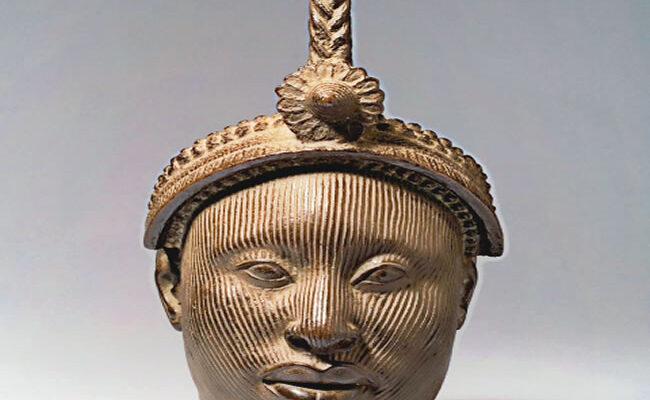

CULT practices have played significant roles in human society, reflecting the complex beliefs and cultural traditions of various communities. Among these cults, the Gelede and Olokun cults hold particular importance due to their focus on female deities and their influence on women’s roles and empowerment. This comparative analysis aims to explore the distinctive features, symbolism and societal significance of Gelede and Olokun cult practices, shedding light on their similarities and dissimilarities.
In the context of Yoruba culture, a ‘cult’ refers to a system of religious practices, rituals and beliefs centered around the veneration of specific deities or ancestral spirits, often organised around distinct group of followers who engage in rituals, ceremonies and offerings to honour those deities. ‘Cult’ here does not carry a negative connotation but rather emphasises organised worship and spiritual devotion.

Gelede can be traced back to the Yoruba people of South West Nigeria, particularly among the Ekiti, Oyo and Abeokuta subgroups. Gelede is deeply rooted in Yoruba cosmology systems and cultural practices dating back centuries. The origins of Gelede are intertwined with the worship of various Yoruba deities and ancestral spirits, particularly those associated with fertility, motherhood and the protection of the community, as part of Yoruba religious traditions, Gelede emerged as a means of appeasing these spiritual forces and ensuring the well-being and prosperity of the community. The earliest documented reference to Gelede dates back to the 18th century, although oral traditions suggest that its origins may extend even further unto antiquity. Over time, Gelede evolved into a complex ritual practice involving elaborate performances, music, dance and the creation of intricately carved masks. Gelede performance typically takes place during festive occasions, agricultural festivals and other communal celebrations. This performance serves multiple purposes including honouring female ancestors, celebrating the power of women, promoting social harmony and warding off male violet spirits.
Olokun cult originated among the Yoruba people as well, primarily in the coastal regions of Western Africa. It is predominantly practised by the Yoruba people in southwestern Nigeria, particularly among coastal communities such as Lagos, Ondo and Badagry and by extension, Edo. Olokun is a goddess worshiped primarily by the coastal and riverine communities, believed to control the mysteries and riches of the ocean depths. Olokun is often depicted as a powerful and mysterious goddess associated with wealth, fertility and the vast expanse of the sea. The origins of Olokun worship are deeply rooted in Yoruba cosmology and mythology, where the sea is revered as source of life, abundance and spiritual powers.
According to Yoruba mythology, Olokun is regarded as one of the primodial deities (or Orisa) who played a vital role in the creation of the world. Olokun’s domain encompasses not only the physical oceans but also the spiritual realms beneath the waves, symbolizing the depths of knowledge, wisdom and prosperity.
Historically, Olokun worship was prevalent among coastal communities engaged in fishing, trade and sea activities. These communities relied on Olokun’s blessings for safe voyages, bountiful catches and protection from the dangers of the sea. Olokun ceremonies and rituals often involve offerings and sacrifices made to the deity including food, jewelry and other valuable items thrown into the ocean as gifts. Devotees of Olokun play a central role in mediating between human and spiritual worlds conducting ceremonies, interpreting signs and omens, and invoking Olokun’s blessings on behalf of the communities.
Gelede ceremonies involve masked performances, music, dance and poetry, where men masquerade as women, and pay tribute to the female deities (Iya Nla). These masks symbolise the protective and transformative powers of the divine feminine, while Olokun cult practices involve elaborate ceremonies, often held near bodies of water. Devotees pay homage to Olokun through music, dance and offering.
Gelede cult practice provides a platform for women to voice their concerns and exert influence on their communities. They challenge gender norms and serve as a reminder of women’s vital role in the society. Gelede performances also serve as educational tools, conveying moral values and cultural knowledge to younger generations.
Olokun cult practices highlight the importance of the ocean and its resources to the Yoruba people’s livelihoods. It promotes sustainable fishing practices, economic prosperity and reverence for nature.
The comparative analysis of Gelede and Olokun cult practices reveals their significance in empowering women, challenging gender norms, and preserving cultural traditions within the Yoruba society. Both cults demonstrate the important roles played by female deities and highlight the value of women’s contributions in shaping their communities. By studying and appreciating these distinctive practices, we gain insights into the rich cultural heritage and the dynamic roles of women in African societies.
- Okhamafe is Assistant Chief Curator, National Museum, Owo, Ondo State.
READ ALSO: Ondo guber: We’ll be transparent in distribution, inspection of sensitive materials — INEC








